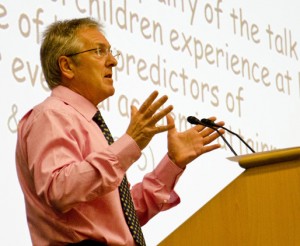Young Children’s Voices in Mathematical Problem Solving
Contributed by Dr Ho Siew Yin and Sng Wei Qin Abbie, from NTUC First Campus, for SingTeach Virtual […]
Read More
Working in groups, solving problems, thinking creatively: These are capacities we want our children to have. But how do we encourage these? Simple, says Professor Neil Mercer. Just get them talking! This article is based on his keynote address at the Redesigning Pedagogy Conference 2013.

What makes the human brain distinctive from other animals? Well, we have brains that are designed to enable us to think collectively.
No other animals can do that. No other animals can come back from an expedition and reflect on what we can do differently tomorrow. This is what we inherited from our ancestors, and it’s still working for us today.
One of the things that the people did was that they talked to each other. And it was through using language as a tool to construct an image of reality – past, present and future – that they were able to make plans, get things done, and improve their joint performance.
So if we are to understand the nature of human cognition, we’ve got to understand the role of language in it.
Language is integrated with cognition, and one of the most influential scientists in helping us to understand this is Lev Vygotsky.
To him, children are born into dialogues, and those dialogues mediate their understanding of the world. Thus, from the minute they’re born, children acquire ways of thinking. By hearing how language is used to make sense of the world, they come to make sense of the world for themselves. He called this the intermental activity.
And as they do their own sense-making and carry out their own actions, they feed back into the social activity of their community. So you’ve got a continuing spiral of development.
He suggested that language was a cultural tool for thinking collectively – we interthink.
We’re not instinctive animals; what we are born with are capacities. So although children have all got the capacity to learn languages, they still need to learn how to use it. And that’s crucial for my theme today, for the teachers’ role in schools.
We can’t just do talk the minute we’re born; we have to learn how to do it. I don’t think children understand or appreciate how important talk is in getting things done.
– Prof Neil Mercer, University of Cambridge
Talking skills are rarely taught in school, and it’s surprising given today’s employment-oriented world. It has to change if we want people to achieve and realize our evolutionary heritage to interthink.
It’s again another distinctive aspect of human life: We take responsibility for the education of our young people, enabling them to realize the capacities that they’ve inherited. For many children, they have a second chance in school. But if children are not being helped in schools, they’re not being helped at all.
Furthermore, the notion of the lone solitary genius is pretty much shown to be incorrect. It’s a myth. Mostly, people who are creative were working in a creative collective of some kind.
They were able to draw on the efforts of other people to enable their own individual contributions to be realized. So, this is really the age which creativity is really a collective achievement. And the way to enable people to think creatively and collectively is through discussion.
Talk is really important for the development of thinking. But what really makes a good discussion? I think most group work is educationally unproductive. What is needed in group work is what we call exploratory talk.
Exploratory talk is a creative and productive dialogue. It possesses these characteristics:
This kind of talk has several educational benefits, as research has shown.
First, it allows students get more involved in learning. Second, they become better at solving problems because they can learn from each other. Third, it improves their individual scores for reasoning tests. Finally, it transfers into better scores for other subjects, like Science and Math.
Just remember, you’re always the expert – and the children need your expert knowledge. One of the things you’re an expert of is how to use talk effectively and how to think collectively.
Useful Resources
Download Prof Mercer’s presentation slides from his keynote address, “Educating the Social Brain: Linking Language, Thinking and Educational Attainment” from the Redesigning Pedagogy Conference 2013 website.
More information about interthinking can be found on Prof Mercer’s Thinking Together Project website.